#Christopher Bidmead
Photo
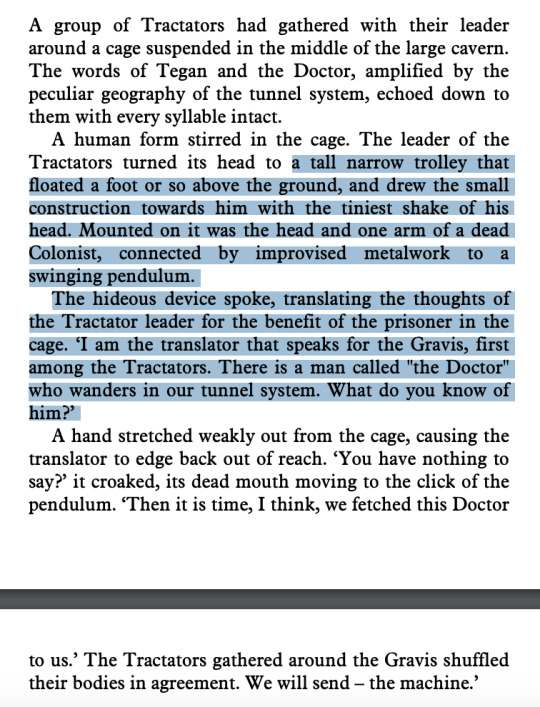
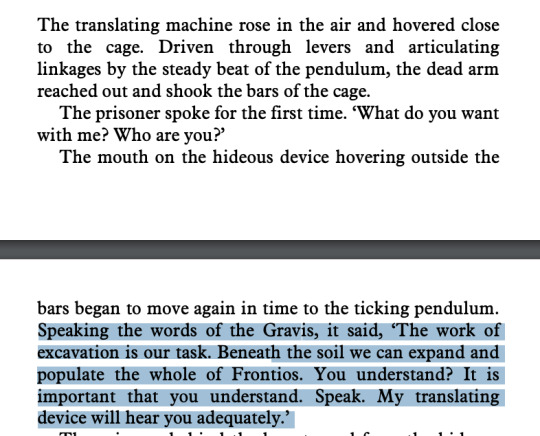

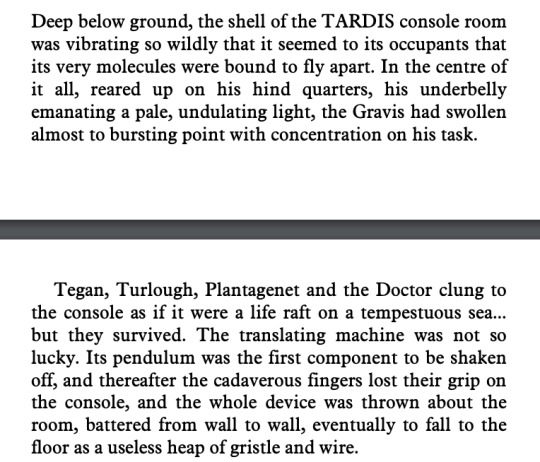
In Chris Bidmead’s (excellent) novelization of his own (fucking excellent) Frontios, the Gravis does not actually speak, and is instead accompanied by a horrid translation machine made of a corpse (like all their machinery) that finally gives up the ghost when the Gravis pulls the TARDIS interior back together, splattering the thing across the gleaming white walls.
65 notes
·
View notes
Text
Where’s the watcher?


There he is!
#dougie rambles#personal stuff#my poor attempt at a joke#oddly terrifying#creepy#shitpost#doctor who#logopolis#the watcher#gifs#there he is#him#the doctor#sort of#london#Albert bridge#liminal#kind of#the oldest view#you have always been here#Christopher h bidmead#cursed#highbrow shitposting
10 notes
·
View notes
Text
In Logopolis episode 4, aired March 21, 1981, Tom Baker's Doctor regenerated into Peter Davison's Doctor. In a departure from past and future regenerations, Davison's Doctor helped prepare for his own death as a mysterious character known as the Watcher. In the episode the Doctor died falling from a radio telescope in a battle with the Master. The episode also marked the last time the Doctor was listed as Doctor Who in the credits until the revived series. ("Logopolis: Part Four", Doctor Who TV Event)

#nerds yearbook#real life event#first appearance#sci fi tv#bbc#march#1981#doctor who#dw#time travel#peter grimwade#christopher h bidmead#5th doctor#doctor 5#4th doctor#doctor 4#tom baker#peter davison#logopolis#k9#the master#anthony ainley#seti#janet fielding#tegan jovanka#matthew waterhouse#adric#sarah sutton#nyssa of traken#nyssa
13 notes
·
View notes
Text
Tom Baker’s “Doctor Who” celebrated in brilliant new DWM Special
Doctor Who Magazine celebrates the 50th anniversary of the Fourth Doctor’s first appearance this week with the release of a fantastic 84-page Special Edition
Doctor Who Magazine celebrates the 50th anniversary of the Fourth Doctor’s first appearance this week with the release of a fantastic 84-page Special Edition, packed with all-new features, interviews, infographics, and fiction from Christopher H. Bidmead, illustrated by Mike Collins.
An absolute treat for fans of Tom Baker’s Doctor – the new Doctor Who Magazine Special 66 – 50 Years of the…

View On WordPress
4 notes
·
View notes
Text
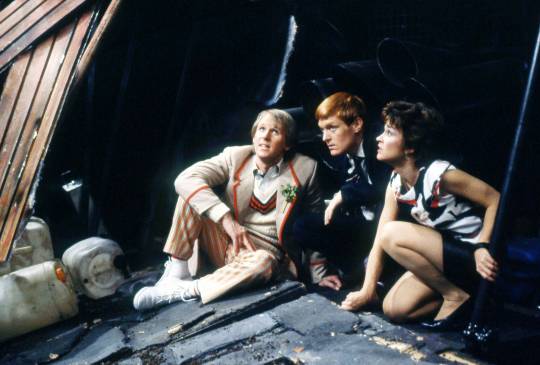
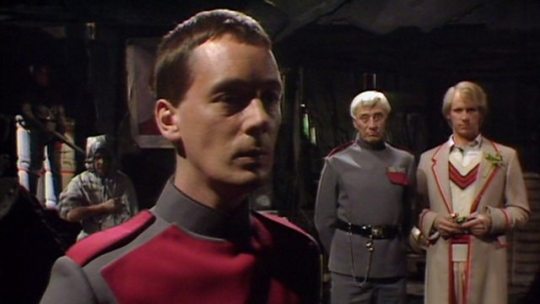
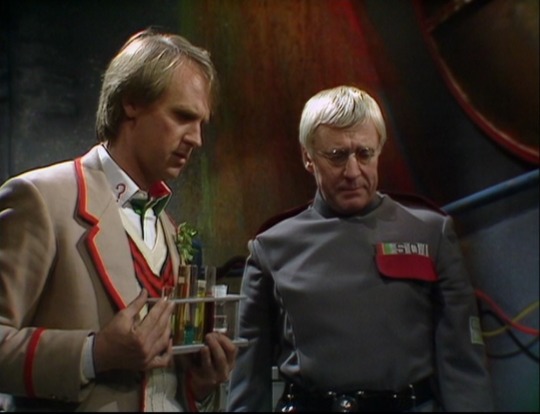
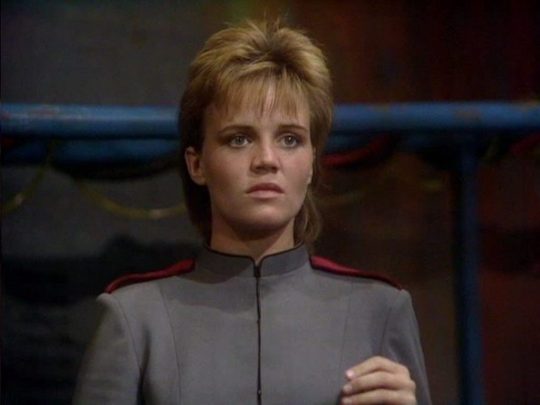
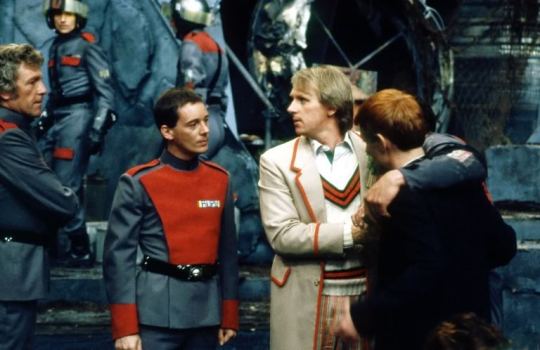
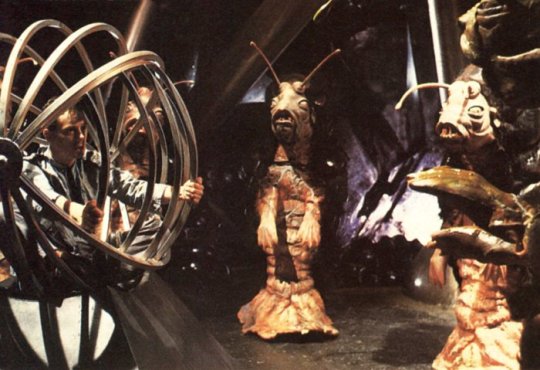
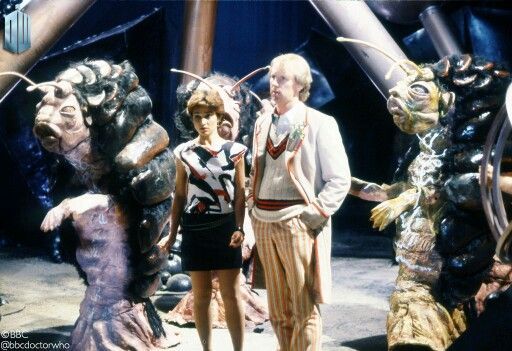
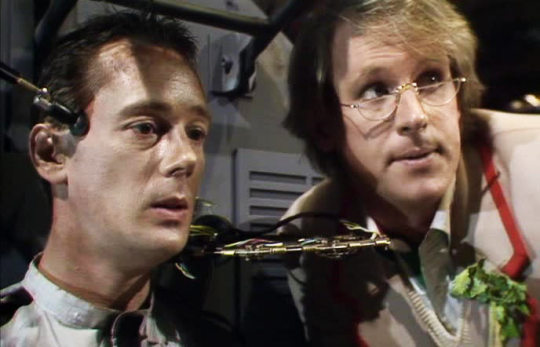
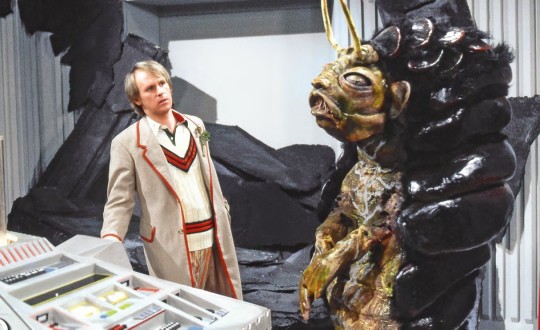
Doctor Who: Frontios (21.3, BBC, 1984)
"It's, um, very good of you to help us, Mr..."
"I'm not helping, officially. And if anyone happens to ask whether I made any material difference to the welfare of this planet, you can tell them I came and went like a summer cloud."
#doctor who#frontios#classic doctor who#bbc#1984#five#christopher h. bidmead#ron jones#peter davison#janet fielding#mark strickson#jeff rawle#peter gilmore#lesley dunlop#william lucas#maurice o'connell#alison skilbeck#john gillett#richard ashley#raymond murtagh#continuing to catch up on those DW eps that somehow passed me by as a nipper; in this case I really don't know what happened‚ bc it was#certainly available on video and uk gold would have shown it. i just missed it somehow? i certainly remember reading the target novel which#painted a very disturbing vision... some of which is surprisingly well realised now I can finally see the episodes! the production design‚#sets and yes even the tractators are all really quite impressive when you consider the budget Who was working on (and the sudden death of#the original designer‚ shortly before production began). there's quite an apocalyptic feel to the first two eps in particular‚ and the plot#is typically intelligent and sciencey for Bidmead. it does feel a little rough around the edges; editing is quite hectic in places and#there's some general handwaving (not least restoring the tardis...). nice to see Bill Lucas playing quite against type as a fuddy old#science type (another last minute replacement‚ after Peter Arne's murder) and Gilmore is fun in a baying military kind of way#some fun amongst the gloom too‚ particularly Five passing off poor Tegan as a robot and pretending to yuk it up with the Gravis#have there been any follow up stories in the dweu? both frontios and the gravis feel like prime material for revisiting mr rtd...
24 notes
·
View notes
Text
More Vision Magazine Stuff
So, I've looked a bit into the origin of all of Five's companions (except Kamelion, who hardly exists as a character) and tracked down early character descriptions for all of them.
Well, not quite for Adric. The Adric description was very short.

We get that he's supposed to be 15, so that's good to know. The thing with Adric is that it seemed like no two writers thought of him as the same character.
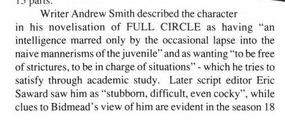
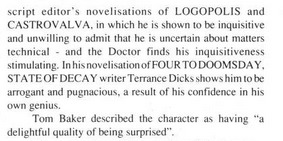
These takes don't entirely need to contradict one another, but it sounds like the writers were all given a kind of vague description and were never on the same page for what to do with it.
Andrew Smith: He's smart but also immature
Eric Saward: He's a brat
Christopher Bidmead: He's curious and the Doctor likes that about him.
Terrance Dicks: He's an arrogant know-it-all.
This also gives off the vibe that Bidmead liked Adric and Saward didn't, which might explain why Adric worked slightly better in season 18 than season 19. The script editor actually wanted the character to work.
I'd personally go for a mix of the Smith and Bidmead approaches. He's a genius, but his knowledge is still limited, something he's reluctant to admit. He can be a bit of a brat, because he's 15. He's literally immature. But, the Doctor sees his potential and admires his curiosity, so he acts as a sort of mentor figure.
Anyway, the character descriptions of other characters that were provided are a little more detailed, so the writers probably had some idea of what they were doing. Going in order of introduction, here's Nyssa:
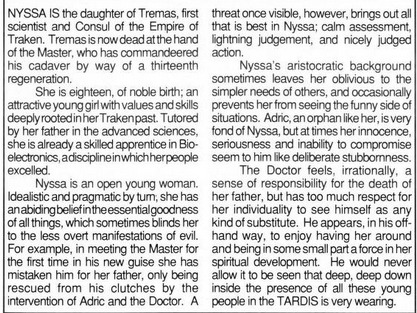
Look at how detailed that is! Here's another one whose age we know (18), as well as her backstory, beliefs, skills, and what both Adric and the Doctor think of her. Most of this stuff isn't really explored in the show, but Big Finish clearly took it and ran with it.
Next, Tegan:
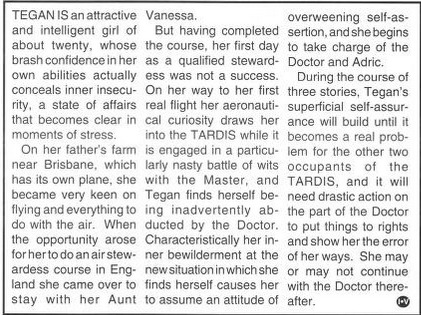
So, we get another detailed background, but while it seemed like everything with Nyssa was worked out, we're not confident about Tegan, not sure whether she's going to stick around or not. She starts with a one-off story arc that sounds kind of annoying, honestly. The girl is accidentally put in a Situation and she responds by taking charge of the Situation. But, she basically has to learn to leave things to the men. I doubt Janet Fielding was happy about this: Playing the "uppity" woman who learns to shut up and follow the patriarch. I don't think the people writing this really thought the implications of this arc through.
So, yeah, I was a bit harsh on that one. It's not too bad as an arc out of context, but considering problems with how Tegan was treated by the writers (and the fandom tbh) later, it doesn't bode well.
Anyway, here's (me obsessing over) Turlough:
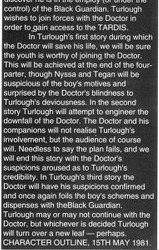
So, Turlough is 20, around the same age as Tegan, which is what I assumed but this does confuse people. I still think it's funny that he's described as blond, they cast a blond actor, and then had him dye his hair red.
You'll notice from the May, 1981 date, that this was early in development and a lot changed between this and what he see onscreen. Turlough's initial arc was written without reference to the stories it occurs in and his introduction doesn't make any sense with the backstory he was eventually given. They meet him on a planet he's lived on for as long as he can remember.
They basically wrote Turlough's arc before the stories of Season 20. He was apparently going to be introduced in a story called The Song of the Space Whale, where he would just be a person on a planet. But, the story fell through and they decided to introduce him in another story, Mawdryn Undead, instead.

The fact that Turlough was in exile was made up to explain him being at Brendon. Apparently just so the story would make sense to the person writing it. You can tell just how much they were making up as the went along.
Lastly, we've got Peri:
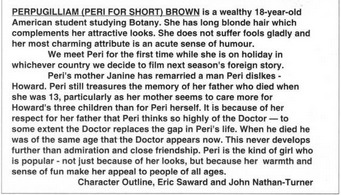
Long blonde hair is basically the opposite of Peri's hair, so this was clearly written well before the role was cast. Also they didn't even know where they were filming "next season's foreign story". It really was just "The Vacation Episode" at this point.
Also, Peri's family life is given a lot of backstory that never comes up onscreen. The description of her dynamic with the Doctor is amusing:
"The Doctor reminds Peri of her dead dad. They remain platonic friends really." As if "surrogate father" would immediately be equated to "potential love interest" because Peri's hot. Peri has daddy issues. Saward and JNT had daddy issues issues.
Also, they clearly had no plans for the Sixth Doctor here. Once again, they made shit up as they went along and hoped it would all work out in the end.
#adric of alzarius#nyssa of traken#tegan jovanka#vislor turlough#peri brown#80s doctor who was a bts trainwreck#at least it's funny
42 notes
·
View notes
Text
A Finely Tuned Response - Frontios, 1984
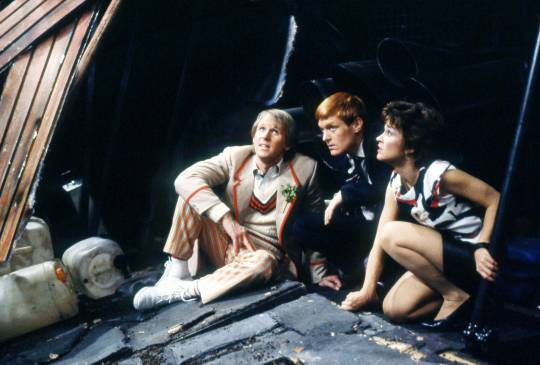
An analysis of Doctor Who of the early to mid 1980s is, somewhat inevitably, an examination of wasted potential and this is a particularly pertinent point to consider when embarking on a critical look at Frontios. To some extent, Frontios is business as usual for the Peter Davison era. Along with The Awakening, it stands-out for being one of only two stories in the season that is not carrying the weight of an enormous event. It is four episodes long, features a typical Doctor Who monster, slots itself effortlessly into the action-packed militaristic flavour of the Davison era and repurposes the trappings of past base-under-siege serials for good measure. This is probably why it gets such little attention from the fandom on the whole; Frontios is a story conceived to slip under the radar.
But I think that Frontios does anything but be unnoticeable. It is screaming to be noticed because I think that this story, more than any other of the Davison era, is the story of untapped potential. Frontios takes everything that we know about the Davison era, every aspect of it that was working, and offers us a glimpse into an alternate reality where everything else also works just a little bit better still. This is thanks to former script editor Christopher H. Bidmead, one of a handful of writers who could comfortably stake the claim of one of the most underrated in the series' history. Bidmead script edited the show from 1980-1981, the entirety of season eighteen, and is notable for following through with John Nathan-Turner's intention to shift the style of storytelling in Doctor Who away from the high-concept, camp adventure series of the previous regime toward more serious-minded stories that had a basis in real-world science. In Bidmead's own words, "[Doctor Who] exemplified for young viewers the power of scientific thinking to solve problems. Science stretched into fantastic future shapes, yes, but the show had a serious social purpose. It must never be silly, never be mere magic....we tried to build our stories on solid, if fancifully extended, scientific ideas."
It is worth stating the obvious here; this philosophy returns the show to its 1963 roots of being educational as well as entertaining. The result of Bidmead and JNT's collaboration was a run of seven stories that had an entirely unique flavour for the franchise. Stories that were rich in theme and subtext, revelling in the unknown possibilities of bleeding edge theories. Take Warrior's Gate, for example. Taking place in the theoretical zero point between positive and negative space, that serial watches like a surreal, poetic and atmospheric novel that meditates on I-Ching philosophy, exploring notions of action, free-will and entropy. Warrior's Gate is a dense and thoughtful production whose characters and setting all interlink to form a greater thematic whole. A bit over twelve months later, Doctor Who was broadcasting stories like Earthshock.
That sounds a little bit more disingenuous than perhaps it should because Earthshock is not a bad story in and of itself but it is a very different story. The tumultuous production of Warrior's Gate and the overall difficulties of Bidmead's position lead to his resignation at the end of season eighteen. The post would eventually be filled by Eric Saward whose conception of what made for a good Doctor Who story wildly contrasted with Bidmead's. Earthshock proved to be the template, the definitive statement for what his ambitions were with Doctor Who; a thrilling, action-packed adventure with a confident blend of character drama and sci-fi serial antics. To use a low-hanging and easy shorthand example, if Bidmead's Doctor Who could be compared to say a Christopher Nolan film then Saward is somewhat of a Zack Snyder.
But this brings us back to the accusation of wasted potential because I would argue that the Fifth Doctor's era is marked by inconsistency more than it is by abject failure. I find it rather interesting that both JNT/Bidmead Who and JNT/Saward Who make a concerted effort to return the programme to something resembling the original conception of the show but in polar opposite ways. In the latter case, it was a more superficial attempt with the turn back toward an ensemble cast and the attempt at tighter stitching from one serial to the next. Most episodes of the Davison era connect in some direct way to the previous one, even if that connection usually little more than a couple of lines at the top of the episode addressing something from the previous one.
The approach that JNT and Saward were aiming for in these three years together, that of an explosive science-fiction soap-opera, is a perfectly valid take on the programme. It was even an effective one on occasion. The problems with Saward's tenure as script-editor are myriad and deserving of dissecting in a piece more dedicated to him but suffice it to say that what Frontios accomplishes is a case of a serial coming together in spite of its circumstances instead of coming out of them. When Bidmead was invited back as a freelancer for Davison’s third, and final, season, he incidentally offered a tantalising glimpse into the era that might have been if he had stuck around with the show. If nothing else, he reaffirms one thing; wildly creative and conceptual science-fiction stories can work hand-in-hand with serialised, evolving character drama.
In contrast to what one might expect, Frontios can perhaps best be described as Bidmead’s most traditional Doctor Who story. Saward invited him to contribute a pitch for a serial in season twenty-one but on the condition that he was to craft something in the mould of a traditional Doctor-Who-monster-plot. As Bidmead recalled in a 1988 interview for Doctor Who Magazine; "Eric Saward phoned me up and asked me to do ‘Frontios’. They wanted the monster element, which was a struggle because I always hated ‘Doctor Who’ monsters – partly because they tend to look cheap and mainly because they are so limited on dialogue. Dialogue is so important in a low budget show – it creates the whole effect". In so far as being a typical monster story for Doctor Who, the broad strokes of Frontios appear to offer little in the way of innovation. Our trio unexpectedly find themselves among colony of humans in the far future only to quickly discover that an unknown, alien threat is causing colonists to disappear into the planet itself. On one level, perhaps this is disappointing for the staunch season eighteen fans (god forbid those nerds ever out themselves) that Bidmead’s final effort on-screen is such traditional fare but, make no mistake, this is Bidmead all over. Where else would one find a story that revels so much in making the setting a character unto itself, or an active threat in this case. There is an almost primal irrational fear underpinning the horror of Frontios which is that of the Earth dropping from beneath you, consuming you without a trace. It is a great idea and legitimately terrifying at a conceptual level. Frontios is the last hope for humanity, the final place that they can run to and this here is the horror at the end of human existence; what comes for us all when there is nowhere left to run?
Frontios is a story about people being where they shouldn’t which is about as clued-in to the central premise of Doctor Who as one could possibly be; the entire franchise is a story of things being where they shouldn't. I love the Doctor’s initial flat refusal to explore Frontios in any way because “knowledge has its limits”. It is an interesting slice of lore, that never really gets picked up on again, that the Time Lords have a limited scope of the arc of history. Perhaps because pulling on this thread could lend too much credence to the theory that Time Lords are future human beings. After all, is there any particular reason why the Time Lords knowledge has a cut off point that coincides with the near end of humanity? It is an effective shorthand to illustrate the stakes at play here and set the scene for the audience but remains an oddly intriguing nugget of lore too. I would not be surprised if this story directly influenced Russell T Davies when he came to writing Utopia since that story also presents the Doctor as going further than ever before and having the immediate reaction of wanting to leave. In this case, I adore that as soon as the Doctor does land, he immediately launches into helping the humans despite what his rational mind has concluded. It is also a little bit weird that the Doctor’s behaviour ultimately leads to no consequences from the Time Lords. We are told repeatedly that he is forbidden to interfere here and that the time laws do not permit his actions. If Saward were a bit more on his ball, perhaps this could have been the inciting incident that puts the Doctor back on trial two seasons from now as opposed to just…well, nothing really.
Bidmead does not write small scale stories. Even this one, which is relatively small fry in the narrative of this season, is as high stakes as actually destroying the TARDIS. Bidmead claims to have done this to give the Doctor no form of security, have him just as desperate and endangered as the humans. Everything is against the Doctor here which makes for a nice unintentional parallel to The Caves of Androzani (also penned by a former script editor) where the same can be said but he’s just a lot less lucky. What is frustrating is that the script makes really no attempt to explain exactly why or how the TARDIS is destroyed. The Gravis does not even know it is there. The Doctor does have one line about it toward the climax; "It's, er it's been spatially distributed to optimise the, er, the packing efficiency of, er, the real time envelope" which sounds dreadfully like he is making it up. Is he suggesting that the TARDIS folded in on itself in an effort to protect itself from the meteor strike? Or was the meteor strike actually supposed to have splintered it? Surely not that second thing since Tegan and Turlough found it to be largely closed off just moments after landing, I have no idea what is really going on here and have yet to find a clear answer in the text but it is a lovely way to visually illustrate the consequences of the Doctor going behind where he even feels he is permitted to travel.
If there is anything that significantly hurts Frontios then it is the production. While not necessarily cheap, the horrific cliffhanger to part three is realised about as well as it could be, this story is hampered by shoddy direction from Ron Jones and some generally poor design. A lot of the horror that ought to be here is nearly squandered by the way the thing is assembled and that is truly frustrating. There is some god awful acting attempting to ‘lift’ some rubble in episode one. How that made it to screen I will never know. In concept, the Tractators are a deeply disturbing villainous creature with their inhuman features and mental powers to ensnare any victim they choose no matter how hard they run. Their plot to chop up human beings to ensure their machinery works was so freaky that Steven Moffat likely stole it to be much scarier in 2006. Bidmead based the monsters on woodlice and, while that intention extended into the design, the Tractators are the textbook definition of a lumbering “Doctor Who monster”. Practically every moment of action they have in the entire story falls completely flat and the monsters are not even remotely scary. They just look like crap. Apparently Jones hired dancers as he imagined the Tractators to curl up like woodlice, something that Bidmead intended in the script. Visual effects designer Dave Harvard did not get this memo it seems. There is a distinct lack of menace and thrill displayed onscreen here despite what are, really, a perfectly strong set of scripts to work from. It is a real shame.
Thankfully, the production can deliver on Bidmead's well-developed supporting cast and he provides a compelling far-future colony for the TARDIS team to get entangled up with. Range is a much an endearing scientist figure to pair the Doctor up with as Plantagenet and Brazen make an irritating opposing force. It is a decidedly bleak vision of the future; a fascist, totalitarian state. In her analysis of the serial, Elizabeth Sandifer makes the suggestion that Bidmead’s more cerebral, world-building story is constantly under jeopardy by Eric Saward’s stock-standard military story, invading the scenes as an opposing force that tries to stop the story from happening. Whether Bidmead was deliberately poking at Saward's tendencies as a writer remains to be seen but it is a very fun read regardless. Bidmead has cited the 1982 Lebanon War as an influence on his scripts which, as of time of writing this article in March 2024, is an interesting situation to cite. The Lebanon War took place between June 6 1982 and June 5 1985 between the Israel Defence Forces and the Palestine Liberation Organisation. The inspiration from the war can certainly be identified in what Frontios would become though it would be absurd too suggest that the story is analogous for the conflict itself. Certainly, the broad strokes of the situation informed the plot but the most significant contribution was an aesthetic one with the serial's war-torn landscape that is clearly suffering from a near constant bombardment that has slowly increased in frequency and intensity over several decades. Indeed, as Range and the Doctor state;
RANGE: Captain Revere assumed that the barrage was some sort of softening up process. Heralding an invasion, he said.
DOCTOR: Hmm, someone else thinks this is their territory.
Revere is half-right. Frontios is an invasion story; the humans are the invaders. This flavour of anti-colonial storytelling is not particularly new ground for Doctor Who to tread and would certainly continue to be well-walked although the allegory becomes a little bit murky in this case with the suggestion that the Tractators are not indigenous to Frontios either. Perhaps the situation of two invading forces staking claim to a land that rightfully belongs to neither was ripped straight from the headlines but the absence of a third party makes it a rather more simplistic and less challenging situation to depict. Again, the influence is purely aesthetic. Cutting edge political satire doesn’t seem to be something Bidmead is particularly interested in anyway, regardless of his effectiveness in writing it.
So, we can conclude that the Tractators are likely not indigenous from pretty early on in the story thanks to Turlough who is awarded one of his strongest roles in any story pos-Enlightenment. Following his failed plot to murder the Doctor, the shifty and morally ambiguous nature of Turlough became an aspect of his character that was largely cast aside. Turlough was introduced as an untrustworthy and selfish survivalist whose past life before exile on Earth were primed to make him a greatly compelling member of the TARDIS team moving forward. However, instead of gradually unravelling this mystery and pushing Turlough’s relationship with his “friends” to their furthest extent, the character spent most of his stories was just separated from the Doctor for about half of the runtime to simply complain and look a bit suss from time to time. A lot of potential character work seemed to be abandoned and relegated to these four scripts and his final story, Planet of Fire. This is yet another example of Saward's limits as a script editor and really the most damning one considering part of this period's mission statement was to be a quasi soap-opera.
After laying eyes on the Tractators, we see a new side to Turlough; pure, genuine fear. Our first glimpses at his origins are finally awarded to us when a race memory is unlocked within him that sees him recoil from the action in a catatonic state. He has a primal reaction to the creatures below the surface. Being the only person with knowledge of the monsters, he gradually pulls himself together and returns to help the Doctor. While not especially interesting an arc in itself, this is a rewarding series of events to put Turlough through if you have been following his story since Mawdryn Undead since it seems that only now he has truly embraced being a force for good with the Doctor and not just a traveller in it only for himself. This is all really solid stuff and Mark Strickson does a decent enough job with it. Turlough lamenting that nobody expects anything heroic of him is a really lovely character moment and this story marks a significant turning point for the character that comes too late. This is the kind of on-going melodrama that should have been present in this era the entire time and this particular development for Turlough needed to happen at, at the latest, the end of the last season. Not two stories before his departure. For his active role as a companion to be claimed eight stories into his run (effectively after twenty-eight episodes on the show) is ludicrous. Even more frustratingly, Turlough takes a backseat again in the next story leaving Planet of Fire to race his character to the finish line and it proves once more that the potential for greatness is all there but this was too little too late.
Tegan is the most sidelined of the three which is irritating not only because this would prove to be her penultimate appearance on the show but also because it officially becomes a pattern of the third story now to give her no kind of active role in narrative. The next serial would do that too though it could be argued by design which is a weak defence in the face of a whole season awarding her next to no material. Given where her character was set to go in Resurrection of the Daleks this and the nature of her departing the TARDIS, this would have been a great time to highlight the brutality of the Doctor’s travels and drop her in the midst of some truly awful acts. Long-form story was really not Eric Saward’s strongest skill.
And then we have the Doctor. Three stories away from his own dramatic exit and finally he feels like he has fully come into his own. This is perhaps the most frustrating realisation to grapple with in regards to Bidmead’s leaving the show; the man knows how to write the Doctor. His take on the character sees the frustratingly underdeveloped Fifth Doctor in a fully authoritative role; barking out orders and opinions to whoever he pleases and commanding presence as much as he needs to. This is a character I would have loved to see for three seasons and it pains me that he is only really found here and in Androzani. At the heart of Frontios is a very simple story that about leadership in a decidedly anti-militaristic sort of way. The humans are being driven by the military but lacking in unity as their leadership in Brazen and Plantagenet is a self, arrogant and narrow-minded leadership that dismisses their scientists and the Doctor when he arrives. As we learn about the Tractators, their leadership is flawed too as the creatures are revealed to be naturally passive without the command, being enslaved, by the Gravis. So, we have the Doctor who is driven but understanding. He listens to the facts, he makes measured judgements and he considers the breadth of his actions. The Doctor is the shining example of good leadership in this colony. It is a very simple moral but who ever said that simplicity was a bad thing?
Sandifer made the acute observation in her Warrior's Gate article that "The Doctor that Bidmead wants are the Doctors that [David] Whitaker wrote for – the small and seemingly harmless men who skulked and observed and learned to understand the system before making a single decisive move within it. Not the Doctors of the 70s – big, starring leading men who were the centre of attention and whose charisma and likability drove the entire story". Here we have found ourselves with, frankly, the biggest victim of wasted potential in Peter Davison's run which, obviously is Peter Davison. It is well-documented that part of JNT's strategy in casting Davison was to provide a stark contrast to the scene-stealing Tom Baker. The Fifth Doctor was a less commanding and intrusive presence by design which is all well and good if your target is a more Whitaker-style take on the character. The problem is simply that they missed.
To this day, the Fifth Doctor comes under fire for being a bland incarnation but that is only half of the truth. What fans criticise as blandness is what I would sooner articulate as a lack of definition. The Fifth Doctor as a character was primarily defined by the things that he was not in comparison to the previous four actors instead of the things that he actually was. This Doctor was not old, he was not commanding, he was not infallible, he was not funny, he was not flippant, he was not cruel, he was not Tom Baker – he was not a lot of things and the things that he was varied greatly from one story to the next. Perhaps this is a little unfair since there was at least an intention of who the Fifth Doctor was supposed to be, even if it was not fully realised onscreen. It is at this point that I feel compelled to clarify also that Davison was not at all the problem here. He is an excellent actor who had very strong and compelling instincts of how to play the part, some of which he and JNT agreed on. In 1981, Davison conducted an interview with Radio Times where he made an attempt to outline his vision for the role;
"I’ll be a much younger Dr. Who, and I’ll be wearing a kind of Victorian cricketing outfit to accentuate my youth. I’d like my Doctor to be heroic and resourceful. I feel that, over the years, ‘Doctor Who’ has become less vital, no longer struggling for survival, depending on instant, miraculous solutions to problems. The suspense of ‘Now how’s he going to get out of this tight corner?’ has been missing. I want to restore that. My Doctor will be flawed. He’ll have the best intentions and he will in the end win through, but he will not always act for the best. Sometimes, he’ll even endanger his companions. But I want him to have a sort of reckless innocence."
This is not quite a description of who the Fifth Doctor is not but in terms of being a definitive statement on what he is it is still somewhat lacking. “Heroic and resourceful" are satisfactory descriptors and the suggestion that he has a “reckless innocence” seems to indicate that he is perhaps simply naive. To say that he is flawed is not particularly revealing without actually delving into what the flaws are but this is certainly a start. There is a blueprint here with which to construct a fully-realised character but the one that made it to screen oscillated wildly from seeming compelling to inoffensive to, yes, bland.
Given the revolving door of script-editors during season nineteen's production, it is perhaps not surprising that, despite having some strong stories on the whole, it was not a definitive opening statement for the Fifth Doctor. Castrovalva took the Doctor out of action for most of its runtime and then had him in the post-regenerative non-character state that left him open to hopefully be defined later on down the track. The larger part of season nineteen fails to define him particularly well with Four to Doomsday, Kinda and Black Orchid each shooting for the unassuming observer type but fail to give him any truly distinct character traits nor a particularly engaging role in the narrative. It shows a near complete misunderstanding of the Whitaker-style Doctor depicting him not as a mercurial learner but a passive observer. The Visitation and Time-Flight shift gears from this to am extent presenting something in the mould of Jon Pertwee's Doctor on paper. The former, however, leaves him still largely sidelined by its comedy supporting character and the latter makes the unfortunate misstep of being Time-Flight.
The Fifth Doctor in season nineteen is a character whose role in the story is dictated by the narrative conventions of Doctor Who. His name is in the title, he is a heroic character therefore he will heroically save the day even if the plot could have happily rolled on much the same without his involvement at all. Black Orchid even takes this to the extreme when it, upon stumbling upon an opportunity for some drama when the Doctor comes under suspicion for murder, he gets away with it by taking the supporting cast into the TARDIS and going "See? I'm Doctor Who so I must be innocent". The only story to offer any glimmer of the characterisation and subversion that was promised is Earthshock but even that immature, emotionally unregulated character would never really come back onscreen.
Season twenty seems to bring little else to the table besides his being generally nice but a bit exasperated at times (and it is worth noting that the subpar quality of the scriptwriting in season twenty is what ensured Davison would not sign on beyond his three year contract). The Fifth Doctor's lack of authority too often came as a failing in the storytelling instead of a failing in the character. Take how he fails to command a scene with the Brigadier in Mawdryn Undead or the lack of interest anybody has in him during Warriors of the Deep. Snakedance is really the only serial that took this idea and ran when Christopher Bailey had to the good sense to present a realistic reaction to the Doctor showing up prophesying doom for all and made that escalation most of his role in the story. The problem hit its peak by the time The Five Doctors made it to screen which, of course, made an embarrassing show of what little characterisation the Fifth Doctor was awarded. Standing next to Patrick Troughton and Jon Pertwee would be difficult for anyone but the Fifth Doctor managed to make it seem impossible.
Part of the problem with the Doctor's lack of definition, of course, stemmed from the approach, or rather the production team's inability to scale the mountain that they had raised for themselves. Having a leading cast as big as four and small as three for all but one of his stories often left the Doctor struggling to command the narrative in any way. It became easy to lean on an archetypical idea of who 'the Doctor' is to make the stories work. This is symptomatic of the broader issue that this production team was not up to the task that they set themselves of introducing a larger cast for a soap-opera style. Darren Mooney, for the m0vie blog, articulated the issue well in his article “Doctor Who?” The Deconstructed Davison Doctor;
"[T]he Fifth Doctor’s era offered a weird funhouse mirror of the [soap-opera] genre. The companions were all given strong archetypal personalities that were designed to play off one another, but without any detail or humanity to round out those archetypes into characterisation. More than that, there was no real sense of progression or character development. None of the companions grew or evolved."
Consequently, this left the most valuable asset for character definition, his relationships to everybody else, severely under-utilised. Again, this was not Eric Saward's strength but, further to that, it was not even his interest. Saward often claimed that the aspect of Doctor Who that compelled him the most were the worlds and characters explored rather than our main ensemble. A perfectly fine stance but not a particularly good focus to take in the most serialised version of the show since it first began.
Something always worth considering when engaging in any form of art criticism is the relationship between artistic intention and audience interpretation. Obviously, the former informs the latter; an artistic work presents evidence and information that is collected and interpreted by the audience. There are a number of ways with which to use this relationship as the basis of a critique. One option is the focus primarily on intention; the artist means for the piece to accomplish X thing and I have assessed the evidence provided to form a conclusion as to why I think it is or is not successful in that endeavour. This option is only viable if that intention has been made clear in some context outside of the actual work itself. Another way to engage is to ignore intention entirely, the death of the author approach; I gathered evidence from the text and interpreted it in this way which I did or did not enjoy for X reasons. Generally speaking, I find that the most insightful and compelling criticism comes from a mixture of both approaches. I find it equally as valuable to glean the context of which the work is made and what the artist is intending to do as I do being able to allow the work to speak to me and take on a life of its own.
In the case of the character of the Doctor between 1982 and 1984, there is a lot to engage with here. As established above, the artistic intention of the Fifth Doctor was deeply confused and underdeveloped. So let us turn to an interpretive reading, the most popular one that has developed among fans over time which is that the story of the Fifth Doctor is tragedy. This reading suggests that this Doctor is a victim of a circumstance, a moral crusader and conventional hero who becomes worn down and killed by the cruel and ruthless universe around him. It is a really compelling take and there is a good amount of evidence to substantiate it. Earthshock is the earliest example where the Doctor’s role in the climax consists primarily of him failing to negotiate with the Cyber-Leader with no option left but to just murder him as he watches his young friend die in an act of heroism he inspired. Then we have Snakedance where his walking into the story doing his typical Doctor thing sees him vilified and antagonised for the larger part of the runtime. Season twenty-one is where the evidence really ramps up. Warriors of the Deep attempts a similar outcome to Earthshock with the Doctor’s lack of authority leading to him enabling a massacre. Frontios sees him literally drawn into a place he shouldn’t be despite his best intentions. Resurrection of the Daleks is such a clusterfuck that it causes Tegan to leave the Doctor altogether and then his simply being on Androzani places him squarely in the middle of events so devastating that everybody there except for Peri winds up dead.
As a reading on his era, this interpretation holds up very well. It is exactly the kind of character development that should have been the crux of Davison's time on the show and is the kind of thing suggested by the publicity and discussions of his character back in 1981. What makes it so frustrating is how much this was not really present in the artistic intent. Yes, the Fifth Doctor was fallible and one of his companions died but this was little more than an aesthetic choice for the larger part of the era. As Sandifer articulated perfectly in her Earthshock analysis;
"What we get [with Adric's death] isn’t drama. It’s the hollow shell of drama – a major character death, a silent credit sequence, a few minutes of horrified and morose main characters at the tail end of this and the start of Time-Flight, and then everybody – the audience included – moves on. It’s not one of the most dramatic sequences of the 1980s. It’s a cheap sham designed to look like drama. It’s a sequence designed to rile up controversy – the exact sort of death scene that would be created by an executive who believes that art should 'soothe, not distract'".
Earthshock was the most important story of the JNT/Saward administration and it makes it also emblematic of a number of things it fails to get right. Adric's death was wasted potential. If the overall arc of the Fifth Doctor's story is a man who has the best intentions but gets beaten down by everything around him, that needs to be in any way at the forefront of his character and his actions in the stories. Eric Saward thought it important to depict violence in a visceral and impactful way which serves the interpretation but was not a calculated move to develop an actual arc.
By the time season twenty-one came around, Davison had hit breaking point with the bland material and an actual character began to emerge. Beginning with this serial, his Doctor finally showed signs of some consistent characterisation. His Doctor had become snarkier and wittier, his occasional emotional outbursts in season nineteen filtering through as a genuine resentment for authority and pig-headedness. As Davison himself stated;
"Frontios was excellent, an extremely well-rounded script that got hold of the way I saw the part of the Doctor, and made his dialogue and actions fit in with this. I enjoyed it because there was really something there to latch onto in rehearsal and make your own. If you like, it had enough there without the actors having to try to embellish a weak storyline."
Thus, this is why Frontios shines so brightly. With some stronger material to play as well in this story through to his final appearance, Davison gets the best chance of his era to actually act. The Doctor is no longer a passive afterthought in the narrative and the season gains a genuine momentum with escalation from one story to the next until the entire narrative structure of Doctor Who breaks down in The Caves of Androzani. Frontios marks the beginning of the Davison era finally starting to land on what really works. We have a Doctor that is genuinely compelling, a very compelling and unique companion in Turlough and a genuinely interesting story that nails the Eric Saward approach to thrilling, action-packed Doctor Who (if only really in the script than actually on-screen). Frontios is really spearheading this last leg of the Davison era and not by mistake.This is a highpoint of season twenty-one and, indeed, of all ‘80s Who. While this is probably Bidmead's weakest script technically (I'd probably watch this over Castrovalva), it demonstrates that old ideas done well still undeniably make for a story that is done really well but it is no surprise that this solid story is consistently overshadowed by the more obviously ambitious milestones of the Davison era. This is the story the Davison era needed but it is a story that just came too late to save it altogether.
A final word: I had no other place to mention this but the Doctor’s line about being a hat person is a little amusing at this point in his life since he hasn’t been seen wearing one for three stories now – he last donned it in The King’s Demons and won’t again until the story after this
#doctor who#analysis#tv#culture#actors#history#peter davison#vislor turlough#mark strickson#janet fielding#tegan jovanka#1980s#1984#sci fi and fantasy#scifi#science fiction#fifth doctor#classic doctor who#classic who#dr who#the doctor#turlough
17 notes
·
View notes
Text
Christopher H Bidmead really said in the target of frontios that five and tegan are going to hold hands for 90% of the second half of the book, and I love and respect him him so much for that.
#me at work going :))))) while reading during breaks#it's a good novelisation. a bit sparse in places but also way more... indepth in other places than the episode itse;f#*itself#random#books#fivetegan#five
16 notes
·
View notes
Text
Doctor Who short trips: Repercussions
"https://archive.org/details/doctorwhoshorttr00russ_528"
Summary:
Doctor Who Short Trips is a series of themed short story anthologies of new Doctor Who fiction, featuring the Doctor in all of his first eight incarnations.
They feature stories written by some of the leading names in Doctor Who, past and present, including Paul Cornell, Gareth Roberts, Christopher H. Bidmead, and Paul Magrs.
Repercussions features 16 tales set on a strange airship taking its passengers on a trip to who-knows-where.
Among the people aboard is young adventuress Charley Pollard, just a few weeks into her life aboard the TARDIS alongside the Eighth Doctor, a man whose past she knows frighteningly little about.
She encounters a diplomat trying to stop a war, a young man seemingly murdered by the Doctor, a tramp, a seismologist, and a republican trying to save the life of his plague-stricken daughter.
One thing they all have in common: an encounter with a strange alien visitor who seemed to help them, but perhaps should have left them alone.
so by "a few weeks into her life aboard the TARDIS" I'd assume at some point after Stones of Venice but before Seasons of Fear. IDK. I guess I'll find out when I read this.
This book can be borrowed for 14 days to read on the web archive, and if you're elligible for the print disabled download for disabled people, you can download a PDF or epub, but Adobe annoys me and doesn't let me put the font as big as I want it so I will be waiting to read this on desktop once I'm done The Dragonriders of Pern.
The web archive also has free automaticly generated audiobooks available.
Definitely don't read this if you don't know who Charley is yet lol.
#free books#books to borrow#Doctor Who#Doctor Who short trips#Charley Pollard#The Eighth Doctor#Doctor Who: Repercussions
1 note
·
View note
Text
AH HAH. I found the blog post !
"Which, of course, brings us to the first big difference between Davies and Moffat [...] Davies did an excellent job providing an expansive and documented back story for his companions. Even those who interacted least with their families (Donna, for example) still felt like they were leaving something behind when they joined the Doctor [...] Almost immediately, Moffat makes it perfectly clear that Amy doesn’t have a back ground. Sure, she has a fiancé, and an aunt… but they don’t seem to feature too heavily in her life. She has no parents. She lives in a big house all by herself. [...] Amy would have a family, a mother, a father. And it would make absolutely no difference."
Difference I never noticed.
Rose - Mom, Boyfriend/ex-Boyfriend, & Dead dad-> AU Dad. All important.
Martha - Mother, Father, Brother, Sister, even her cousin technically (same actor). Mother was always important entire family was why she left the doctor.
Donna - Mother, Grandfather. Mother played a role but grandfather played arguably a role equal to a companion in terms of plot.
vs
Amy - No parents until Big Bang 2. They are there for 1 episodes. Never mentioned again. Aunt was mentioned and shown but never truly a character.
Rory - Parents not mentioned until third season. The doctor didn't even know it was Rory's dad. Brian tells the Doctor to bring them home alive and he doesn't— and the closure for this character happens but not on TV where it matters most since the "bring them home alive" was on TV.
You could argue that Amy & Rory a married couple is rather novel for the doctor since one companion mentioned in Sarah Jane Adventures that she left the doctor because she got married. Very sure 11 was trying to avoid a Rose situation and to a lesser extent a Martha situation.
Clara - Mother is dead. No idea what happened to father. Neither are important except for the leaf. Until the xmas special then she has a grandma, her father I guess, .... and a ... step mom?
Bill - Mother is dead.
Amy Rory Clara and Bill all seem to be only children as well.
"...larger change in Moffat’s characterisation of the Doctor. Davies suggested that the Doctor was “the lonely god”, a borderline deity who tried to temper his power by travelling with human companions. In contrast, Moffat argues that the Doctor is more of a trickster or an imaginary friend [than] an all-powerful god-like being. Indeed, The Eleventh Hour feels more decidedly like fantasy than anything in the Davies era, with a “mad man in a box” dropping out of the sky to comfort a little girl, only to abandon her as she grows up."

Despite what various script editors (including Christopher Bidmead) might claim, the show was always more science fantasy than science fiction – and Moffat’s interpretation embraces that from the get-go. That’s arguably the biggest difference between Moffat and Davies to be found in this episode. Davies imagined the Doctor as a fantastic figure intruding on a mundane life. To Moffat, the Doctor is just part of a tapestry of the fantastic.
I just love that summary "Doctor Who is more science fantasy" and the author is right Davies leans towards science fiction writing Moffat leans towards science fantasy writing and both are great
I honestly don't see the need for Davies vs Moffat.
I will say Davies episodes make me sad way way more often.
1 note
·
View note
Text
Warrior's Gate - 4
This awakening Is not the Doctor's doing; Nothing shall prevail.
2 notes
·
View notes
Text
Castrovalva: The Doctor in the Land of Metafiction (Part 2 of 2)
Castrovalva: The Doctor in the Land of Metafiction (Part 2 of 2)
I ended up writing far more words about The Somewhat Less Interesting Half of Castrovalva than I ever imagined I would, but we are now finally onto the Really Good Stuff. Hoorah!
Please note: This review contains extensive spoilers.
Episode 3
Why did the Doctor decide to leave the Zero Cabinet? This sounds like the beginning of one of those why-did-the-chicken-cross-the-road jokes from 1980s joke…
View On WordPress
#Adric#Anthony Ainley#Castrovalva#Christopher H. Bidmead#Derek Waring#Doctor Who#Fifth Doctor#Fiona Cumming#Frank Wylie#Janet Fielding#Matthew Waterhouse#Mergrave#Michael Sheard#Nyssa#Peter Davison#Portreeve#Ruther#Sarah Sutton#Shardovan#Tegan
1 note
·
View note
Text
In 1981, the time traveling alien known as the Doctor (Doctor 4) and the Master arrived in England to the Pharos Project to beam a program into deep space to save the universe. Once the universe was safe, the Master tried to blackmail the whole Cosmos. The Doctor was able to stop him but was killed in the process and regenerated into his 5th incarnation. The Doctor added Tegan to his companions. ("Logopolis", Doctor Who vlm 1, TV)

#1981#nerds yearbook#sci fi tv#bbc#doctor who#dw#christopher h bidmead#peter grimwade#regeneration#tom baker#doctor 4#4th doctor#logopolis#peter davison#doctor 5#5th doctor#the master#anthony ainley#janet fielding#tegan#matthew waterhouse#adric#sarah sutton#nyssa
5 notes
·
View notes
Photo




Consider- the Master just doing a cameo for no other reason than to fuck with the Doctor
Picture: Christopher Bidmead
Bidmead: If you’re going to wheel on the Master, he’s certainly not an extra, he’s not a small-part player. He’s the main story, and he’d better be there for a damn good reason.
49 notes
·
View notes
Text
Zero Room for Error
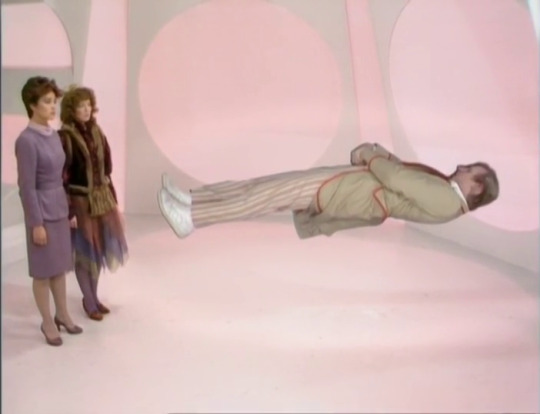
Over his seven-year reign as the Doctor, Tom Baker had his ups and his downs. While seen as the definitive Doctor by many, towards the end, even Baker himself was tiring of the role. On top of that, the writing had begun to border along the outlandish. In "The Power of Kroll," the Doctor saves himself and others by emitting a high pitched scream that shatters glass. In another story, he saves the very metallic K9 from a furnace with his bare hands. However, it would seem that such heroics go back even as far as "The Android Invasion," where the Doctor jumps from the top of a building, unscathed. Ironic then, that a drop from a radio telescope not that much higher, should spell his death. Perhaps this was just the first of many course corrections the new showrunners hoped to achieve- bringing the Doctor back down to earth, so to speak.
With the introduction of Peter Davison as the Fifth Doctor, "Castrovalva," seems the most interested in lending some vulnerability to the character. There's a sort of pensive quality to a character having freshly fallen to his death. It spells out a very "look before you leap," plan of action moving forward. Sure, being the action hero is badass, but in the words of Dennis Reynolds- "You know what's badass? Being alive." But how much of Castorvalva is being economical, and how much of it is just plain stingy?
After a very weird regeneration scene involving "the Watcher," Tegan, Nyssa, and Adric rush the Doctor toward the safety of the TARDIS, all the while being chased by security guards leftover from "Logopolis." It's a fairly pointless scene that could have just picked up inside the TARDIS, but it's a chance to see Anthony Ainley's pillar of a TARDIS show a little menace, shocking the guards and Adric. Nyssa's remark about hating his face marks the first and last time she will ever mention the Master wearing her dead father's face- a plot point which I feel went woefully unexplored. At this time, there's not a lot of sense as to how or why the Master fits into the story, other than "He was in the last one."
Inside the TARDIS, the Doctor's regeneration is acting up, requiring him to need the use of the "Zero Room," a previously unmentioned area deep within the TARDIS. Along with misnaming his companions, he's also reliving past incarnations, allowing us to see Davison's impressions of both the First and Second Doctors, which admittedly aren't too bad. (His First Doctor is better than David Bradley's! Yeah I said it!) When I first watched this episode, I was horrified to find the Doctor unravelling the iconic scarf of his predecessor. But upon today's viewing, I saw it as a rather gutsy move on the writer, Christopher Bidmead's behalf. Leaving the thread behind as a trail of bread crumbs back to the console room is exactly something the Doctor would do.
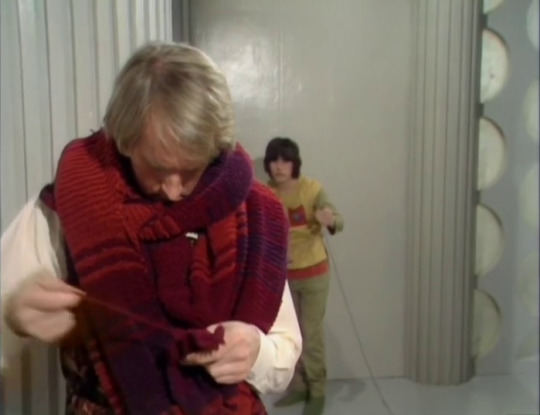
After putting the TARDIS into motion, Adric follows the Doctor into the depths of the TARDIS. Meanwhile, Nyssa and Tegan desperately try any information on the TARDIS computer that might help the Doctor. Their conversation waxes philosophical about recursion and the word "if," which leads Tegan to wonder if the TARDIS index file could be reached by typing "I.F." into the console, which it does. This gives them the information they need to find the Zero Room and help the Doctor.
While the Doctor is searching, he finds the pieces of what will become his new costume, with a few red herrings peppered in. While he takes to the cricketer uniform, he leaves the recorder and big green wellies behind. The cricket bat needing a bit of linseed oil shows us that there appears to be an entire room of the TARDIS dedicated to the sport of cricket. One is led to wonder if there are other rooms dedicated to other sports and whether they're all British pastimes. While the concept of an Anglophile alien with a cricket room is rather absurd, it's the making stuff of Doctor Who.
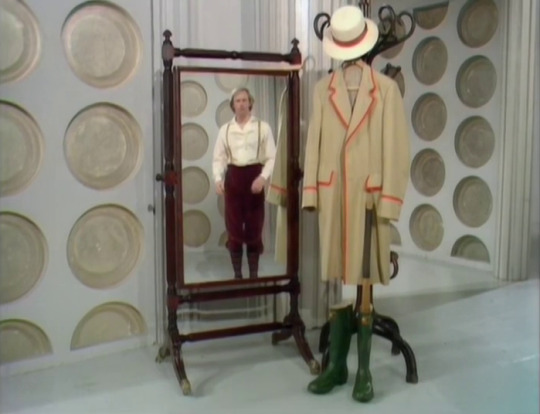
After the disappointing portrayal of the TARDIS that was "The Invasion of Time," it was nice to see a more sci-fi interior. While it was clearly the same corridor elements rebuilt, and rearranged, it was still better than an old hospital with ugly whitewashed brick walls. These corridors at least felt like they belonged in a space ship. Even the Zero Room does a nice job of developing the TARDIS a little bit. That being said, it also undoes a bit of its own hard work, the second it gets introduced.
The Doctor explains to Tegan and Nyssa that the room is completely unaffected by outside influences. Even the gravity is equalised. Being inside this room has already improved the Doctor's cognitive faculties, as evidenced by his ability to get his companion's names right. He begins to levitate where he will suspend himself until his regeneration is complete. But this is interrupted by outside forces, when the Master appears on a screen, with Adric tied up like his leather slave in some sort of web. It's like the razor wire scene from the "Suspiria" remake with none of the real danger. How the Master is able to penetrate the Zero Room, or how he kidnapped Adric is anyone's guess. Is Adric even there? It’s not made clear.
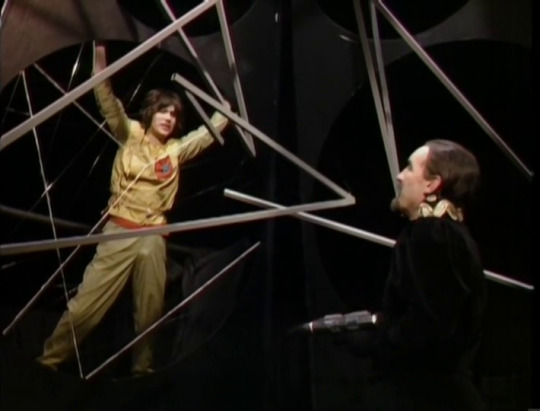
The Master sends the TARDIS on a collision course with the formation of a galaxy. You may remember this danger from another TARDIS heavy story- "The Edge of Destruction." Only instead of trying to stab one another with scissors, the TARDIS fills up with hydrogen and threatens to explode. The Doctor jettisons various rooms from the TARDIS, enabling him to convert the matter into energy, allowing them to thrust away from the event, and into safety. The only problem is, this also jettisons the Zero Room in the process. This bit has always confused me, as the TARDIS seems almost nigh-infinite inside. Rooms seem less like physical spaces, and more like files on a computer. Couldn't they just make another Zero Room?
Nyssa and the Doctor set about building a to-go Zero Room out of its doors, encasing the Doctor in it like a coffin made out of TARDIS wall. There in goes our hero, where he will sleep much of the story away. Back to the Master and Adric, still tied up and writhing in a way that will leave those of us not on a watchlist feeling uncomfortable. Bless Matthew Waterhouse, he's acting his little ass off, and he's still awful. The Master then tortures Adric until he agrees to help him. This betrayal under duress is never explored further, it's just a bit of light betrayal that will become common for Adric.
After reading on the TARDIS computer of a place called Castrovalva, Nyssa and Tegan decide to take the Doctor there to regenerate in peace. Upon arriving, the deep forest is unkind to the high heel wearing duo as they wheel the Zero Coffin around on a wheelchair. Nyssa's poor choice of footwear lands her waist-deep in some peaty water, which leads to an admittedly rather adorable reaction shot on Sarah Sutton's behalf. I was struck with the utter cheapness that was this scene. I tried to imagine Clara Oswald pushing a silly white box around on a wheelchair, and it just didn't scan. The companions of old really don't get enough appreciation. They were asked to sell some pretty stupid stuff.
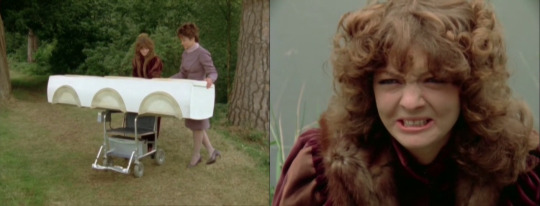
While looking for Castrovalva (which is evidently the city, not the planet), our heroes are being stalked by men dressed as a cross between a Weber grill and a muppet. After some pointless padding in the form of running about, they are captured and subjected to a surprising level of hospitality. After removing their hunting gear, we see that the Castrovalvans are an intelligent people, whose only real shortcoming as a society is their choice of headgear. They allow Tegan and Nyssa the comforts of home, while the Doctor sleeps. That evening they roast a pig over the fire, which made me laugh a little. Something about seeing earth animals on alien planets always feels a little odd to me. Sure, there are humans, but that makes more sense than say a mouse in Jabba's palace, or PIGS IN SPAAAAACE.
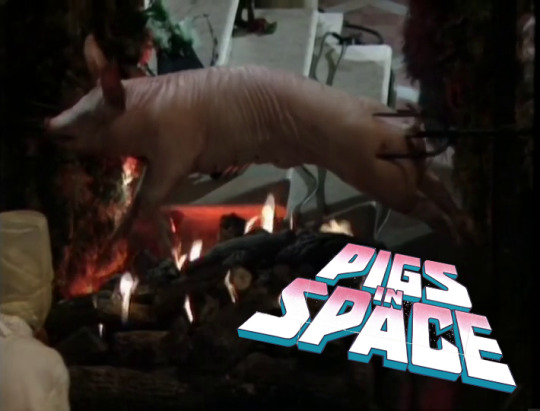
A lot of the action at this point has come to a dead standstill. The Doctor is sleeping most of the adventure away, which is, to me at least, the worst way to do a regeneration episode. Pertwee was asleep for Spearhead, Davison sleeps through Castrovalva, Tennant sleeps while a Christmas tree wrecks Jackie Tyler's living room... Even Capaldi and Jodie sleep through their regenerations. This does lend the story a sense of urgency, but usually, it's more boring than anything. I much prefer a Matt Smith style "I'm still cooking," manic start, than the Peter Davison sleepy time show.
Once Davison is up, he does a decent enough job filling in the shoes of the Doctor. Though upon my first viewing of the story, I did not think so at all. Going from Tom Baker to Peter Davison was like going from the toy store to the bank. The Fourth Doctor is my favourite Doctor, so it just wasn't very exciting for me. And like I said, I can see now why they may have wanted to tone the Doctor down a bit. Davison is your father's Doctor. His performance is more subtle. Only now am I even coming around to a point where I appreciate what he does, which is what brought me to this story in the first place. I've been revisiting him with a renewed interest.
The episode ends after the Doctor discovers the city is in a state of recursion. Like an Escher drawing, the physical layout of the castle loops in and out of itself, trapping its inhabitants, except for when they need to go hunting. (I guess?) The Master, of course, has been there all along in old man double-hat drag. The Doctor tricks the Master into thinking he's still in the Zero Coffin by filling it with books on the history of Castrovalva. While the Master shoots a box, the Doctor is rallying the citizens of Castrovalva and breaking them of the spell of recursion, allowing them to see with eyes unclouded.
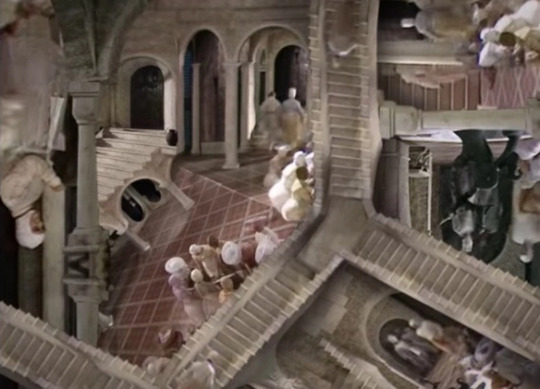
After revealing a tapestry is actually the web that holds Adric, using his mathematical mind to maintain the lie that is Castrovalva, their leader Shardovan destroys the web with a chandelier, causing the city to begin to collapse. The Doctor, his friends, and Adric flee to safety. The Master is not so lucky, as the people tear at him like an angry mob. He becomes trapped inside the city as it fades into nothingness. Upon returning to the TARDIS, the Doctor finds Tegan's landing job askew but assures her that she didn't actually fly the TARDIS, much to her disappointment. I too was a little disappointed. It would have been nice to see the flight attendant become a pilot. It did, however, lead to what I consider one of my favourite Doctor Who memes.
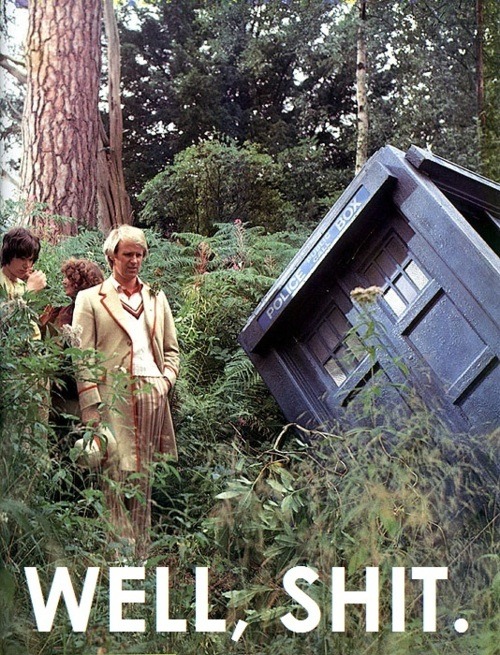
As a "Doctor's first story," goes, I've seen worse. "The Twin Dilemma," will always hold the "What were they thinking?" title. But on its own, I'm not sure I would say it's a wholly successful story. Lots of the plot points are glossed over, and/or made no sense. But there are a lot of things I like about the serial. It's a rare occurrence where the companions were each given a little something to do, despite the crowded TARDIS. I even found Adric tolerable in this one. The world of Castrovalva was uniquely designed and could have stood up to even further exploration. Although I would suggest watching the special edition, as it does the Escher bit far more justice. I also appreciate any episode that incorporates more of the TARDIS into the story. It seems most writers treat our old girl as simply a means of conveyance, which is unfortunate. I wish they would have allowed Davison to maintain a bit of the zaniness from these few episodes, as they promised a Doctor that was a little more cheeky than the one we got. But by the end of it all, he's got his friends, he's got his TARDIS, and he's got his celery. It's hard not to want to watch the next episode.
#Doctor Who#Fifth Doctor#peter davison#nyssa#tegan jovanka#adric#sarah sutton#janet fielding#matthew waterhouse#castrovalva#tardis#recursion#if#the master#anthony ainley#Time and Time Again
14 notes
·
View notes
Text
Top 5 Worst Days for Turlough
Okay maybe I'm as bored as I implied in the last post but this isn't a top five you're gonna find anywhere else.
Basically, here are five stories where very bad things happen to Turlough from least bad to most bad. Obviously, these are my perceptions and other people might not be put this in the same order. Also, I haven't seen everything, so I might miss something big and just not know.
Also, this turned out really fucking long because I just had to rant about number 1.
Number 5: Loups-Garoux (Big Finish Audio from 2001, written by Marc Platt)
I'm only putting this one at the bottom because Loups-Garoux is mostly a comedic story and Turlough seems to recover fine. He sees a vision of his dark side so terrifying he jumps out of a moving train and gets eaten by a werewolf, who spits him out because he has silver on him. Unlike in many of these examples, the Doctor seems a bit upset about this. But, this almost feels like business as usual.
Number 4: Trap for Fools (Big Finish Short Trip from 2018, written by Stephen Fewell)
Okay, this one might be a bit of a me thing. I can get a bit overly sensitive about the subject of mean teachers. In order to find and defeat the Monster of the Week, the Doctor has Turlough go undercover as a student at Space Brendon, basically. The Doctor seems completely oblivious to Turlough's misery and doesn't do much to help him through reliving experiences he was willing to kill to escape. This is another one that's mostly played for laughs, with most of the Horrors Turlough faces being mild bullying and a teacher pronouncing his name wrong on purpose to be a dick, but Turlough is actually intimidated by the mean teacher and mentally categorizes the other students by how much of a threat they might be and is just generally miserable the entire time.
Really, there's one bit that made me decide that this belonged on the list because it's really sad:

Someone please hug him.
Number 3: The Velvet Dark (Short Trip: Farewells from 2006, written by Stewart Sheargold)
The Master shoots Turlough with the TCE, making the Doctor think he'd just casually murdered him, only to reveal that he shrunk Turlough without killing him to make him a more manageable hostage. The Master places him in a box and shakes the box around when the Doctor hesitates in cooperating with him.
This story starts with the Master faking his death and the Doctor, Tegan, and Turlough attending his funeral. Tegan doesn't get why the Doctor is sad that the guy who killed her aunt is dead now. Turlough also doesn't get it, but he doesn't have as much of a personal reason to hate the Master, so he tries to be patient and Tegan seems kind of jealous that the Doctor listens to him more than her.
After being returned to his proper size, Turlough hates the Master just as much as Tegan does. The Doctor, apparently unable to truly hate the Master, kind of treats them both like the bad guys in this.
Number 2: Frontios (TV Serial from 1984, written by Christopher H. Bidmead)
An actual TV story! Tractators. Trion, at some point in the planet's history, was attacked by this story's Monster of the Week and now all Trions, regardless of when they were born, remember the Tractators on some level. It's never explained how this actually works, but Turlough personally had probably never heard of the Tractators until he saw a tunnel and a massacre just showed up in his brain. The Doctor awkwardly hands him off to the one-shots to go explore the tunnels, not knowing what to do about all this emotional stuff.
You'll notice that the Doctor's response to whatever happens to Turlough is a major factor in how I rank these.
Anyway...
Number 1: The King of Terror (Past Doctor Adventure novel from 2000, written by Keith Topping)
It isn't even close. The novels of the Wilderness Years (1990-2004) were aimed at an adult audience and there were very few limits on what sort of situations the Doctor and his companions could end up in. So, sometimes, shit got dark. I usually tend to find these morbidly funny, because saying things like "The Doctor and Dodo meet the Marquis de Sade" and "Doctor Who's Cannibal Holocaust" is fun. It just is. Shut up.
These books vary in quality. Some actually do interesting things with their darker subject matter while others are just sort of edgy for the sake of it. The King of Terror is in the latter category and is annoying as hell about it. I could go into way more detail about every stupid thing that happens in this book, but the Turlough stuff is the most interesting stupid thing, because of how fucked up it is.
So, Turlough, feeling a bit OOC on a trip to Los Angeles in 1999, goes to a bar, gets completely wasted, and chats up local girls trying to get laid. Then one woman stands out as hypnotically sexy, introduces herself as Eva, and invites Turlough back to her place to have sex. Turlough is too drunk to notice that this is moving a bit fast.
Anyway, Eva is actually a member of an alien species called the Jex who are trying to take over the world. They want to terraform Earth to be more like their homeworld, which has a hotter, thicker atmosphere, but their human slaves wouldn't be able to do hard labor in those conditions, so they want to genetically modify the humans to have higher heat resistance, among other things. There's something wrong with Jex DNA, so they need the DNA of some other alien with higher heat resistance.
The CIA, wanting to see where this is all going, tipped the Jex off that some aliens had just showed up in LA and Eva went out to kidnap one. Turlough then spends like half the book being experimented on to both confirm that he's an alien and that he's the right type of alien.
It's a lot of torture. I'm not even going to say any of what happens. Here's one screenshot of Turlough reflecting on all the torture happening to him that is vague but sums up why I'm not going to elaborate:
(Note: There actually is a reference to something specific in here and I apologize in advance)

Meanwhile, the Doctor and Tegan find out that Turlough's missing. Tegan seems to think that they should do something about this, while the Doctor comments jokingly on how often Turlough gets captured. He eventually gives Tegan the day off to take her mind of things, leading to a really stupid romance subplot, while he does absolutely nothing to find Turlough.
Turlough eventually very brutally murders Eva in an understandable lapse of sanity and escapes. The Doctor isn't even there when he gets back and they reunite "offscreen". From that point on, the whole subplot is basically dropped. The Doctor asks Turlough if he's okay, he lies and says he is, the Doctor knows it's a lie, but he's glad for a chance to act like it never happened.
So, it really sucks to be Turlough and I'm now exhausted.
#vislor turlough#stories to base your whump and h/c fics around#loups garoux#trap for fools#the velvet dark#frontios#the king of terror#a lot of very bad things happen to turlough#i don't even know what to tw this for#or if I need to#so sorry i guess
28 notes
·
View notes